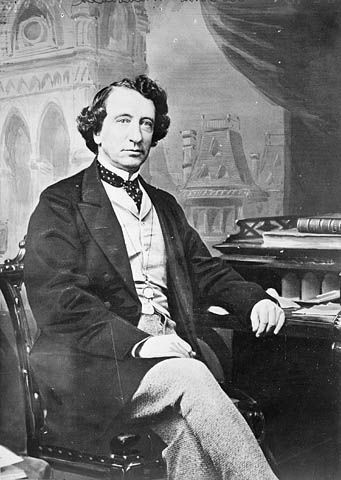|
J. E. Brownlee
John Edward Brownlee, (August 27, 1883 – July 15, 1961) was the fifth premier of Alberta, serving from 1925 until 1934. Born in Port Ryerse, Ontario, he studied history and political science at the University of Toronto's Victoria College before moving west to Calgary to become a lawyer. His clients included the United Farmers of Alberta (UFA); through his connection with that lobby group, he was involved in founding the United Grain Growers (UGG). After the UFA entered electoral politics and won the 1921 election, new premier Herbert Greenfield asked Brownlee to serve as his attorney-general. Brownlee agreed and was elected to the Legislative Assembly of Alberta in a by-election in the riding of Ponoka. As attorney-general, he was an important member of Greenfield's government. He was closely involved in its most important activities, including efforts to better the lot of farmers living in Alberta's drought-ridden south, divest itself of money-losing railways, ... [...More Info...] [...Related Items...] OR: [Wikipedia] [Google] [Baidu] |
The Honourable
''The Honourable'' (British English) or ''The Honorable'' (American English; see spelling differences) (abbreviation: ''Hon.'', ''Hon'ble'', or variations) is an honorific style that is used as a prefix before the names or titles of certain people, usually with official governmental or diplomatic positions. Use by governments International diplomacy In international diplomatic relations, representatives of foreign states are often styled as ''The Honourable''. Deputy chiefs of mission, , consuls-general and consuls are always given the style. All heads of consular posts, whether they are honorary or career postholders, are accorded the style according to the State Department of the United States. However, the style ''Excellency'' instead of ''The Honourable'' is used for ambassadors and high commissioners. Africa The Congo In the Democratic Republic of the Congo, the prefix 'Honourable' or 'Hon.' is used for members of both chambers of the Parliament of the Democratic Repu ... [...More Info...] [...Related Items...] OR: [Wikipedia] [Google] [Baidu] |
United Farmers Of Alberta
The United Farmers of Alberta (UFA) is an association of Alberta farmers that has served different roles in its 100-year history – as a lobby group, a successful political party, and as a farm-supply retail chain. As a political party, it formed the government of Alberta from 1921 to 1935. Since 1935, it has primarily been an agricultural supply cooperative headquartered in Calgary, Alberta. , UFA operates 34 farm and ranch supply stores in Alberta and over 110 fuel stations in British Columbia, Alberta and Saskatchewan. Founding as lobby group UFA was founded in 1909 as a government lobby group following a merger between the Alberta Farmers' Association and Alberta branches of the Canadian Society for Equity. The UFA began as a non-partisan organization whose aim was to be a lobby group promoting the interest of farmers in the province. In 1913, under president William John Tregillus, the UFA successfully pressured Alberta's Liberal government to organize the Alberta Farme ... [...More Info...] [...Related Items...] OR: [Wikipedia] [Google] [Baidu] |
Political Radicalism
Radical politics denotes the intent to transform or replace the principles of a society or political system, often through social change, structural change, revolution or radical reform. The process of adopting radical views is termed radicalisation. The word derives from the Latin ("root") and Late Latin ("of or pertaining to the root, radical"). Historically, political use of the term referred exclusively to a form of progressive electoral reformism, now known as classical radicalism, that had developed in Europe during the 18th and 19th centuries. However, the denotation has changed since its 18th century coinage to comprehend the entire political spectrum, though retaining the connotation of "change at the root". History The ''Oxford English Dictionary'' traces usage of 'radical' in a political context to 1783. The ''Encyclopædia Britannica'' records the first political usage of 'radical' as ascribed to Charles James Fox, a British Whig Party parliamentarian who in ... [...More Info...] [...Related Items...] OR: [Wikipedia] [Google] [Baidu] |
Great Depression In Canada
The worldwide Great Depression of the early 1930s was a social and economic shock that left millions of Canadians unemployed, hungry and often homeless. Few countries were affected as severely as Canada during what became known as the "Dirty Thirties," due to Canada's heavy dependence on raw material and farm exports, combined with a crippling Prairies drought known as the Dust Bowl. Widespread losses of jobs and savings ultimately transformed the country by triggering the birth of social welfare, a variety of populist political movements, and a more activist role for government in the economy. In 1930-1931 the Canadian government responded to the Great Depression by applying severe restrictions to entry into Canada. New rules limited immigration to British and American subjects or agriculturalists with money, certain classes of workers, and immediate family of the Canadian residents. Economic results By 1930, 30% of the labour force was out of work, and one fifth of the popula ... [...More Info...] [...Related Items...] OR: [Wikipedia] [Google] [Baidu] |
Canadian Pacific
The Canadian Pacific Railway (french: Chemin de fer Canadien Pacifique) , also known simply as CPR or Canadian Pacific and formerly as CP Rail (1968–1996), is a Canadian Class I railway incorporated in 1881. The railway is owned by Canadian Pacific Railway Limited, which began operations as legal owner in a corporate restructuring in 2001. Headquartered in Calgary, Alberta, the railway owns approximately of track in seven provinces of Canada and into the United States, stretching from Montreal to Vancouver, and as far north as Edmonton. Its rail network also serves Minneapolis–St. Paul, Milwaukee, Detroit, Chicago, and Albany, New York, in the United States. The railway was first built between eastern Canada and British Columbia between 1881 and 1885 (connecting with Ottawa Valley and Georgian Bay area lines built earlier), fulfilling a commitment extended to British Columbia when it entered Confederation in 1871; the CPR was Canada's first transcontinental railway. ... [...More Info...] [...Related Items...] OR: [Wikipedia] [Google] [Baidu] |


